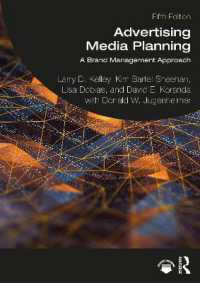- ホーム
- > 洋書
- > 英文書
- > Performing Arts
Full Description
The Oxford Handbook of Scottish Theatre tells the story of drama and performing in Scotland from the earliest traces of folk plays, performances, and royal ceremonies in the medieval period right up to the challenges of the present post-pandemic moment in the professional theatre. It brings together distinguished scholars, theatre professionals, critics and reviewers to share their experiences of studying and in some cases producing the most significant landmarks of Scottish stage history, discussing pivotal plays and productions (Lyndsay's Ane Satyre of the Thrie Estaitis, Ramsay's The Gentle Shepherd, Home's Douglas, adaptations of Rob Roy and the 'National Drama', Lamont Stewart's Men Should Weep, Lochhead's Mary Queen of Scots Got Her Head Cut Off), writers (including Joanna Baillie, J.M Barrie, James Bridie, John McGrath, and the writers of the radical post-Millenium generation), and companies (including The Scottish National Players, The Glasgow Citizens, 7:84, Wildcat, Communicado, and the National Theatre of Scotland) alongside incisive accounts of the cultural contexts (from the Reformation to the Thatcher government and beyond) that produced and challenged them.
Separate chapters explore Scots language and Gaelic drama; the popular theatrical forms of the travelling 'geggies', music hall, variety, and pantomime; theatre for young audiences; radio and television drama; the significant roles of the director and the theatre critic and reviewer in shaping Scottish theatre; and the Scottish stage's long history of dialogue with performance traditions in England, Ireland, and Continental Europe. Contributors describe the often-fierce struggles that led to the opening up of the Scottish stage to working-class voices and audiences, women writers and performers, writers of colour, LGBTQ+ voices, innovators in dramatic form, and the long process leading towards the foundation of the NTS, and its early work alongside other key developments in the twenty-first century.
Contents
Preface
Introduction
SECTION I: HISTORIES
Medieval to 1700
1: Sarah Carpenter: The Theatre Scene I: Stages, Performers, Audiences: Medieval to 1700
2: Pamela M. King: The Theatre Scene II: Stages, Performers, Audiences: The Sixteenth and Seventeenth Centuries
3: Greg Walker: Major Play I: Sir David Lyndsay, Ane Satyre of the Thrie Estaitis: Renaissance Scotland's Best Kept Secret?
The Eighteenth Century
4: Rebecca Tierney-Hynes: The Theatre Scene III: Stages, Performers, Audiences: The Long Eighteenth Century
5: Brianna Robertson-Kirkland: Major Play II: Allan Ramsay, The Gentle Shepherd (1725 & 1729)
6: Ian Brown: Major Play III: John Home, Douglas (1756)
7: Penelope Cole: The London Scots
The Nineteenth Century
8: Barbara Bell: The Theatre Scene IV: Stages, Performers, Audiences in the early Nineteenth Century
9: Alison Lumsden: Major Play IV: Rob Roy
10: Clare Brennan: Major Playwright I: Joanna Baillie
11: Paul Maloney: The Theatre Scene V: Stages, Performers, Audiences in the late Nineteenth Century
12: Penelope Cole: J.M. Barrie and Turn-of-the-Century London
1900 to the Mid-Twentieth Century
13: Ian Brown: The Theatre Scene VI: Stages, Performers, Audiences, 1900-1950
14: David Goldie: Companies and Writers: 1900 to 1940
15: Donald Smith: The 1920s and After: The Scottish National Players
16: Gerard Carruthers: Major Playwright II: James Bridie and His Theatre
17: Linda Mackenney: Popular, Political Theatre in the 1920s, 30s, and 40s
18: Linda Mackenney: Major Play V: Ena Lamont Stewart, Men Should Weep
The Mid-Twentieth Century to 2000
19: Ksenija Horvat: The Theatre Scene VII: Stages. Performers, Audiences, c.1950-2000
20: Anne Varty: Scottish Playwrights 1950-1970
21: David Hutchison: 'Citizens and Studios': The Glasgow Citizens, Traverse, and Close Theatres
22: Olga Taxidou: John McGrath and 7:84: 'The Moon Belongs to Everyone'
23: Tom Maguire: The Post-1980 (post-Devolution Bill) Scottish Theatre Renaissance
24: Randall Stevenson: Major Play VI: Liz Lochhead, Mary Queen of Scots Got Her Head Chopped Off
The Twenty-First Century
25: David Overend: The Theatre Scene VIII: Stages, Performers, Audiences: The Twenty-First Century
26: Allan Radcliffe: The National Theatre of Scotland: Theatre Without Walls
27: Nicola McCartney: New Playwrights: Plays and Playwriting in Scotland, the 1990s to the 2020s
SECTION II: THEMES AND VARIATIONS
28: John Corbett: Scots Language Drama (including Translation/Adaptation)
29: Michelle MacLeod: The Professionalisation of Gaelic Drama
30: Paul Maloney: Popular Theatre, Music Hall, Variety and Pantomime
31: Ben Fletcher-Watson: Theatre for Young Audiences in Scotland
32: Femi Folorunso: Influences from Abroad
33: Gerry Mulgrew: Directing
34: Bruce Young: Radio Drama
35: Brian Hoyle: A Makeshift Bastard . . .': Peter McDougall's Just Your Luck and Just Another Saturday Night and Troy Kennedy Martin's 'New Drama for Television'
36: Mark Fisher: Critics and Reviewers
37: Michael Billington: Afterword
Index






